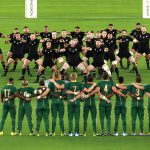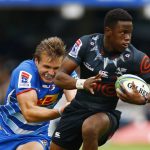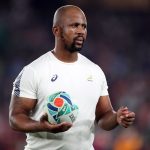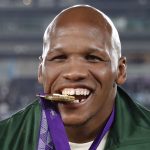Jacques Nienaber more than qualified to be Bok coach
Outgoing Springbok coach Rassie Erasmus has vouched for his replacement, citing SA Rugby’s vision for coaching continuity and the rugby acumen Nienaber has racked up behind the scenes.
Author:
5 February 2020

To those not entirely sold on Jacques Nienaber’s qualifications to be the new Springbok head coach, his playing record is unlikely to make a compelling case for his recent appointment either.
He ticks the enviable box of having played rugby at Grey College in Bloemfontein. But the height of his playing powers as a looseforward enforcer, weighing in at a negligible 63kg, peaked in the none-too-lofty backwaters of the school’s seventh team.
Add to this that the bespectacled Nienaber would make a good “if accounting was a person” meme and you have fans of the world champions scratching their heads, perplexed as to what they did to deserve a no-name brand as a head coach.
There are valid reasons for concern about the 47-year-old’s improbable ascension to the top job. As has been widely reported, he has never been a head coach at any level and SA Rugby did not advertise the post to gain a sense of what big-name coaching pull the world champions might have had internationally.
Related article:
The main cause for apprehension around Nienaber’s lack of experience is that in recent years, the South African rugby landscape has become enamoured with making out-of-the-box coaching appointments, to the point where said box doesn’t seem to exist anymore.
Looking at the Lions as an example, Super Rugby head coach Ivan van Rooyen is a former conditioning coach with just 15 Currie Cup games under his belt as coach. And Warren Whiteley hasn’t even lost his six-pack yet from playing last year, such was the haste to install him as the new forwards coach.
Slowly but surely, the exception is becoming the rule in how South African franchises are hiring their coaches. But though Nienaber’s recent appointment may seem a copy-and-paste case, his circumstances are drastically different.
‘Normal question’
The same physiotherapist, defence and strength and conditioning coach jobs being cited to question his suitability for the Bok coaching position are the same reasons we should take his claims to the top job seriously, said SA Rugby director of rugby Rassie Erasmus, Nienaber’s boss and long-time friend and coaching collaborator.
Erasmus said he understood why the media was querying the trust put in Nienaber. He also challenged commentators to do their due diligence and ask his former staff members and players their opinion as to whether or not the new appointee is the right man for the job.
“It’s a very normal question to ask, so I can totally understand it,” began Erasmus, pointing out that new Ireland coach Andy Farrell has also never been head coach before. “It’s something I would have asked if I didn’t know him that well or weren’t in the Springbok setup. But people forget that he was actually the high performance manager at SA Rugby when I was general manager.
“I think the winning percentage of the SA Schools and the junior Springbok teams during the time he managed their coaches was 90%. Not a lot of people know that. In the Springbok environment, there were a lot of times where I let him lead camps. And going forward, there was always an idea of us going in that direction.”
Related article:
Erasmus explained how Nienaber’s unlikely path to head coach has prepared him for the job. “As a physio way back in 1996, he was sending messages from the coaches to me as the captain. To do that, you actually need to know the game plan and the calls, and not just relay messages.
“Lying on his physio bed back then, he would chat rugby for a whole 90-minute session. And you’d realise that, oh shit, this guy’s talking a lot more sense than many of the coaches.”
Quietly confident
Following that realisation, Nienaber was gradually given more responsibilities, such as warming up the team, which morphed into him becoming the conditioning coach. Once he’d done well at that, he was challenged to come up with conditioning drills for the defence, something he did so well he became the defence coach.
Each time he was given a new responsibility, Nienaber – described as thorough, methodical and professional – excelled. His defence coaching has become something of a calling card, with his defences the best in the Currie Cup (with the Cheetahs), Super Rugby (Stormers), Pro 14 (Munster) and the World Cup. The Springboks conceded just four tries in the seven games en route to winning the Webb Ellis Cup, two of them coming from their opening game against the All Blacks.
While aware that his appointment is as high-risk as his balls-to-the-wall rush defence, Nienaber – who will be assisted by Deon Davids, Mzwandile Stick, Daan Human and Felix Jones – is quietly confident he can do the job.
Related article:
“When people say it’s a massive risk that I haven’t been a head coach before, they’re probably right,” he explains. “I can’t argue, I haven’t been head coach before. But I’m not stupid, I understand that this might be a risk for me and the organisation.
“We have discussed how we’re going to manage that going forward. But I wouldn’t have accepted the job if I didn’t think I could do it.”
Coaching continuity
Nienaber’s unorthodox journey to international coaching began unpromisingly. While passionate as a school rugby player, he was better as a distance runner. And low grades stumped his initial efforts to get into physiotherapy, the job that ultimately got his foot in the door.
This necessitated a detour via the equally unusual route of taking a gap year by going to the army in 1991. There he met a certain Rassie Erasmus, then the roommate of a friend of his, and it seems as though the two haven’t left each other’s sides since.
“People will say that’s a weird pathway to take, but if you look at all the top head coaches, work ethic, being passionate about the game and loving the players they work with is the constant thing. Everyone’s got a different story to tell about how he got to where he is, but the constant thing is we work hard, are passionate about our teams and players.”
Erasmus said that had they advertised the job, they may have unearthed a coach with a better track record than Nienaber. But having made such incredible strides in the 20 months they have been together, they were keen not to break the momentum by introducing a new man at the helm.
Related article:
SA Rugby president Mark Alexander was blunt about why they didn’t go that route: “Big companies don’t advertise when they’re getting a new CEO. The key thing for us was continuity and succession. When Rassie was appointed two years ago, those were the key principles we had in place.
“What happens every four years is we go out, advertise, get a new coach in and we change all the systems. This brings in a lot of confusion and it takes a lot of time for the players to settle down. We’ve gone through this ever since we entered the World Cup. This will be the first time we’ll have continuity after the World Cup.”
Erasmus’ reasoning
Erasmus reckons Nienaber’s past as SA Rugby’s high-performance manager will stand him in good stead with the players, because he knows them from when they were youngsters. He explained the qualities that should also make him a good Bok coach.
“He’s very loyal as a friend and very professional as a coach. But most importantly, he’s the guy that fits in with people, whether it’s a big or small group, or one-on-one. He’ll make friends with anyone. He’s the kind of guy where whenever there’s an awkward situation, he’ll be the ice-breaker.
“I think it’s a skill he had to learn from when he was a physiotherapist. In that job, you get all kinds of different patients with whom you must have sympathy. There were many times he had to give confidence to players who weren’t playing well.
“You have to remember that in a team environment, a physio has at least 40 minutes of one-on-one time with players, whereas a coach only has about 10 to 20 minutes.”
Erasmus added that his job as director of rugby will be so hands-on that he’ll be in the coach’s box with Nienaber. The point, he said, is to make sure that the new head coach is getting support in real time and to free him up to focus on the coaching, not the overall planning that can bog a coach down.
Big adjustments
A married father of two, Nienaber is already in the midst of another biggish adjustment in his life. “The kids [son Carlo and daughter Lila] have just gone to boarding school, so it’s quite strange to have just my wife [fellow physio Elmarie Nienaber] and I at home in the evening.”
Another big change will be the number of interviews the media-shy Nienaber has to do – he once asked not to be put up for interviews when first involved with the Boks in 2011 – not to mention the novelty of sitting in a coach’s box. He’s only ever been there twice in more than two decades of coaching.
He is so used to patrolling the touchline with the head coach’s messages ringing in his headphones that when he did once share a coach’s box with Erasmus, the latter was still barking instructions to Nienaber by way of his Walkie Talkie while seated right next to him.
Related article:
“I saw my role as similar to that of Wayne Smith. He was with the All Blacks for years as an assistant coach, but was never in the frontline with regards to the media. The nice thing about that is you can focus on your job, do your analysis and talk to the players, because you have time for one-on-ones.”
Erasmus described Nienaber as the guy who’s always “with it” socially in the Bok coaching team. He knows the best wines to drink and the best spots to visit on tour, not to mention that he makes the kind of effort his boss has never made when it comes to his wardrobe.
Should the new man be in search of omens as he heads into his latest unknown, the venue of his announcement as Springbok coach, the Southern Sun Pretoria Hotel, should provide it. “I said when we walked in here that when we [the Free State Cheetahs] won the Currie Cup in 2005, our team room was the same room where we just had the press conference.”





